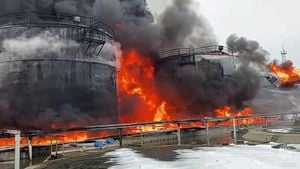McDonald's finds itself at the center of scrutiny following a nationwide E. coli outbreak linked to its popular Quarter Pounder burgers, leading to significant health concerns and legal actions. With over 100 reported illnesses across 14 states, this incident has prompted investigations and prompted the fast-food chain to make swift operational changes.
The outbreak, traced back to slivered onions supplied by Taylor Farms, began making headlines after health officials confirmed 104 cases of E. coli, resulting in 34 hospitalizations and, tragically, one death reported in Colorado. The Centers for Disease Control and Prevention (CDC) estimates the actual number of infections could be much higher, as many infected individuals may not seek testing.
According to the CDC, the onset of illness among those affected began as early as September 12 and extended to mid-October, identifying the onions as the likely source of the bacterial contamination. The states hardest hit include Colorado, Iowa, and Kansas, with the onset of illness reported mainly among individuals aged 13 to 88 years, emphasizing the vulnerability of children and the elderly to such foodborne illnesses.
McDonald's acted swiftly, suspending sales of Quarter Pounders containing slivered onions across about 20% of its restaurants nationwide following the warnings from health authorities. The company reassured customers it had ceased operations with the affected onion supplier and had conducted thorough testing on its beef patties, which all returned negative results for the bacteria.
Health officials have focused their investigations on collecting onion and environmental samples from affected McDonald's locations and suppliers, with the FDA working closely with both Taylor Farms and the fast-food giant to address the outbreak. Thankfully, they found no immediate food safety concerns at McDonald's restaurants, and the company was able to find alternative onion suppliers.
On October 29, McDonald's CEO Chris Kempczinski issued public apologies to affected customers, offering “sincere and deepest sympathies” to those impacted, stating the company was committed to rectifying the situation. He noted, "Food safety is something we will never compromise on, and we remain committed to doing the right thing." This sentiment was echoed by many within the company as they began to restore menu items at the affected restaurants.
The fast-food giant resumed sales of the Quarter Pounder with slivered onions at over 900 restaurants after conducting extensive reviews and audits of its supply chain. They reassured customers through their public statements, emphasizing their dedication to food safety protocols, including new supplier checks and more stringent oversight.
While the outbreak might seem over, it has not been without significant repercussions. Numerous lawsuits are now pending against McDonald's, including one class-action suit seeking over $5 million. Plaintiffs argue the company failed to adequately warn consumers about the safety risks and did not adhere to proper food safety regulations. Legal representatives assert customers were due for compensation for the hardships faced during the outbreak.
Despite McDonald's attempts to regain consumer trust, the incident raises recurring questions about food safety standards and the processes companies have for sourcing their ingredients. Dr. Shane Speights, Dean of the New York Institute of Technology College of Osteopathic Medicine at Arkansas State University, underlined the public's common misconception linking E. coli primarily to undercooked meat. He emphasized, "When you think about E. coli, it’s not always undercooked meat but can also be contaminated produce. The onions were likely not cleaned thoroughly or sourced from infected areas during processing. If contamination occurs at any point—whether it’s from the field, processing facility, or during transport—it can be transferred to consumers."
This outbreak shines a light on the food industry and how quickly situations can escalate, resulting in serious consequences for public health and corporate accountability. With more illnesses tied to the outbreak staring at the company, the road to recovery will require more than just restoring menu items; it will demand transparency, trust, and stricter adherence to safety protocols moving forward.



